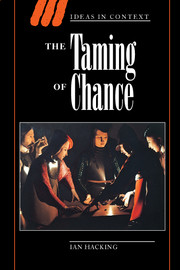Book contents
- Frontmatter
- Contents
- Acknowledgements
- 1 The argument
- 2 The doctrine of necessity
- 3 Public amateurs, secret bureaucrats
- 4 Bureaux
- 5 The sweet despotism of reason
- 6 The quantum of sickness
- 7 The granary of science
- 8 Suicide is a kind of madness
- 9 The experimental basis of the philosophy of legislation
- 10 Facts without authenticity, without detail, without control, and without value
- 11 By what majority?
- 12 The law of large numbers
- 13 Regimental chests
- 14 Society prepares the crimes
- 15 The astronomical conception of society
- 16 The mineralogical conception of society
- 17 The most ancient nobility
- 18 Cassirer's thesis
- 19 The normal state
- 20 As real as cosmic forces
- 21 The autonomy of statistical law
- 22 A chapter from Prussian statistics
- 23 A universe of chance
- Notes
- Index
- Ideas in Context
22 - A chapter from Prussian statistics
Published online by Cambridge University Press: 05 June 2014
- Frontmatter
- Contents
- Acknowledgements
- 1 The argument
- 2 The doctrine of necessity
- 3 Public amateurs, secret bureaucrats
- 4 Bureaux
- 5 The sweet despotism of reason
- 6 The quantum of sickness
- 7 The granary of science
- 8 Suicide is a kind of madness
- 9 The experimental basis of the philosophy of legislation
- 10 Facts without authenticity, without detail, without control, and without value
- 11 By what majority?
- 12 The law of large numbers
- 13 Regimental chests
- 14 Society prepares the crimes
- 15 The astronomical conception of society
- 16 The mineralogical conception of society
- 17 The most ancient nobility
- 18 Cassirer's thesis
- 19 The normal state
- 20 As real as cosmic forces
- 21 The autonomy of statistical law
- 22 A chapter from Prussian statistics
- 23 A universe of chance
- Notes
- Index
- Ideas in Context
Summary
Berlin, 22 July 1880 The incompetent statistics that are the product of this agitation force us once again to recall the first commandment for a statistician: thou shalt not bear false witness against thy neighbour.
My chapters have become successively more removed from daily affairs. The early numbers printed by enthusiasts and bureaux generated the idea of statistical laws. Ideas about causation were revised. New content was given to the notion of normalcy. I have increasingly moved from practical matters to abstract ones. I shall conclude with the statistical epistemology and metaphysics of C.S. Peirce, a high-powered speculative philosopher if ever there was one. But the numbers that set these steps in motion were intended to be administrative tools. Lest we forget that, let us return to an example. I began this book with two anodyne moments in Prussian statistics: here is a third and more problematic one.
The ‘agitation’ of the epigraph was the wave of antisemitism that peaked in the new German Empire during 1879–81. We are here concerned with only one tiny aspect of it: the use or abuse of statistical data. As Salomon Neumann went on to complain ‘“the mass immigration of Jews across the Eastern frontier of the German Empire” has been quite simply erected into a statistical axiom. For the masses it summons up a nightmare, but it is no less effective in higher society, even in the learned world, where it is dressed up in economic or ethnological clothing, or some similar garb.’ Neumann subtitled his pamphlet ‘a chapter from Prussian statistics’.
- Type
- Chapter
- Information
- The Taming of Chance , pp. 189 - 199Publisher: Cambridge University PressPrint publication year: 1990

